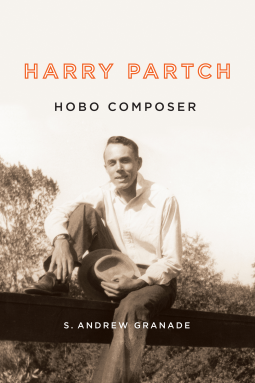
Harry Partch, Hobo Composer
Hobo Composer
by S. Andrew Granade
This title was previously available on NetGalley and is now archived.
Buy on Amazon
Buy on BN.com
Buy on Bookshop.org
*This page contains affiliate links, so we may earn a small commission when you make a purchase through links on our site at no additional cost to you.
Send NetGalley books directly to your Kindle or Kindle app
1
To read on a Kindle or Kindle app, please add kindle@netgalley.com as an approved email address to receive files in your Amazon account. Click here for step-by-step instructions.
2
Also find your Kindle email address within your Amazon account, and enter it here.
Pub Date Oct 01 2014 | Archive Date Mar 18 2015
Boydell & Brewer | University of Rochester Press
Description
Examines the impact of Harry Partch's hobo years from a variety of perspectives, exploring how the composer both engaged and frustrated popular conceptions of the hobo.
Harry Partch (1901-74) was one of the most distinctive and influential American composers of the mid-twentieth century. During the Great Depression, Partch rode the railways, following the fruit harvest across the country. Although he is renowned for his immense stage works, such as Delusion of the Fury, and his use of highly sophisticated instruments of his own creation, Partch is still regularly called a "hobo composer." Yet few have questioned this label's impact on his musical output, compositional life, and reception.
Focusing on Partch the person alongside the cultural icon he represented, this study examines Partch from historical, cultural, political, and musical perspectives. It outlines the cultural history of the hobo from the mid-1800s through the 1960s, as well as those figures associated with the hobo's image. It explores how Partch's music, which chronicled a disappearing subculture, was received, and how the composer ultimately engaged and frustrated popular conceptions of the hobo. And it follows Partch's later years to question his response to the hobo label and the ways in which others used it to define and contain him for over thirty years
S. Andrew Granade is Associate Professor of Musicology in the Conservatory of Music and Dance, University of Missouri-Kansas City.
Harry Partch (1901-74) was one of the most distinctive and influential American composers of the mid-twentieth century. During the Great Depression, Partch rode the railways, following the fruit harvest across the country. Although he is renowned for his immense stage works, such as Delusion of the Fury, and his use of highly sophisticated instruments of his own creation, Partch is still regularly called a "hobo composer." Yet few have questioned this label's impact on his musical output, compositional life, and reception.
Focusing on Partch the person alongside the cultural icon he represented, this study examines Partch from historical, cultural, political, and musical perspectives. It outlines the cultural history of the hobo from the mid-1800s through the 1960s, as well as those figures associated with the hobo's image. It explores how Partch's music, which chronicled a disappearing subculture, was received, and how the composer ultimately engaged and frustrated popular conceptions of the hobo. And it follows Partch's later years to question his response to the hobo label and the ways in which others used it to define and contain him for over thirty years
S. Andrew Granade is Associate Professor of Musicology in the Conservatory of Music and Dance, University of Missouri-Kansas City.
Advance Praise
No Advance Praise Available
No Advance Praise Available
Marketing Plan
No Marketing Info Available
No Marketing Info Available
Available Editions
| EDITION | Other Format |
| ISBN | 9781580464956 |
| PRICE | $80.00 (USD) |



